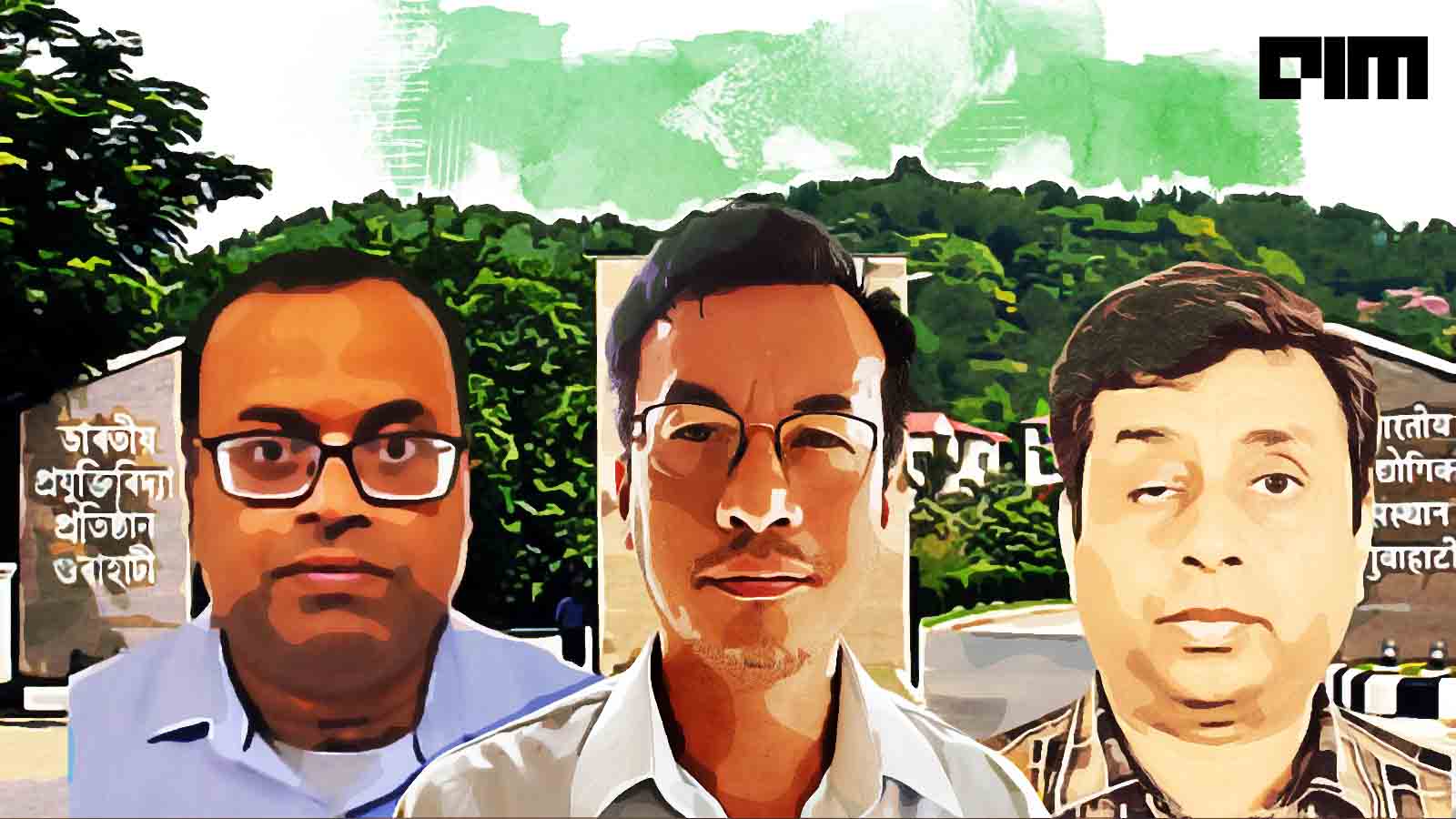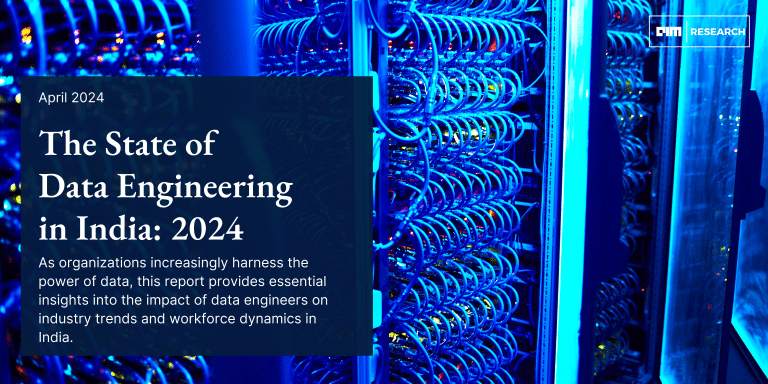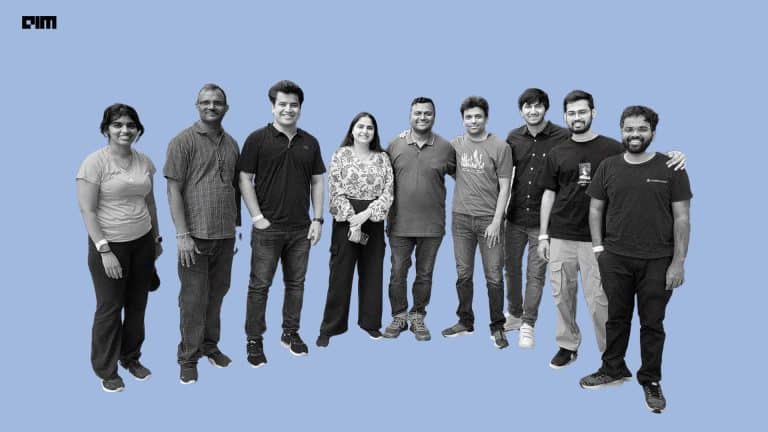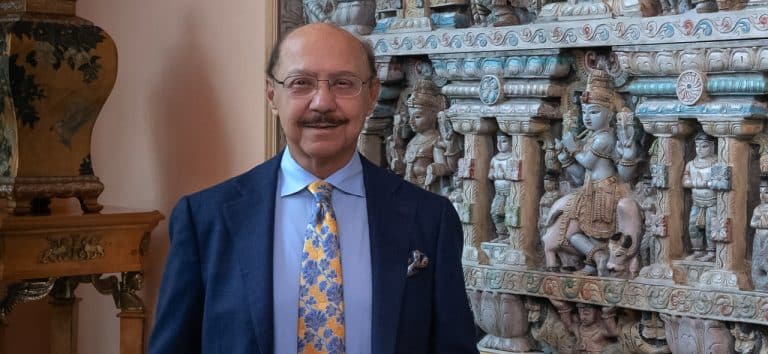The Indian Institute of Technology, Guwahati (IITG), established in 1994, has a vision: “To be recognised globally for excellence in education, research and innovation, and nurture future leaders, to serve the society at large.”
Analytics India Magazine got in touch with three IITG professors, namely Ratnajit Bhattacharjee, Siddhartha Pratim Chakrabarty, and Ashok Singh Sairam, to understand IITG’s contributions to the burgeoning field of AI and Data Science in India.
- Prof. Ratnajit is from the Electronics and Electrical Engineering Department, IIT Guwahati and Head, Mehta Family School of Data Science and Artificial Intelligence.
- Prof. Siddhartha and Ashok are from the Department of Mathematics, IIT Guwahati and the Associated Faculty, Mehta Family School of Data Science and Artificial Intelligence.
AIM: What’s IIT Guwahati’s approach towards AI education and research?
Professors: Keeping in pace with the evolving nature of Artificial Intelligence (AI) and Data Science (DS), and the potential of applicability of these subjects in various sectors, the Indian Institute of Technology Guwahati (IITG) has initiated several steps to strengthen its contribution:
- Three departments of IITG, namely, departments of Computer Science and Engineering (CSE), Electronics and Electrical Engineering (EEE) and Mathematics, came together to launch the first interdisciplinary M. Tech Programme in Data Science. The program, running successfully since 2019, allows students from different branches of engineering and technology with a valid GATE score in different disciplines. The first batch of graduates got good placement in the industry.
- Subsequently, IIT Guwahati established the Mehta Family School of Data Science and Artificial Intelligence (MFSDS&AI) with generous support from the USA’s Mehta Family Foundation (MFF). The MoU signing event between IITG and MFF was graced by the Principal Scientific Advisor (PSA), Government of India (GoI) and Secretary, Science and Engineering Board (SERB). The school is soon going to admit its first batch of B. Tech students from 2021 through JEE (Advanced). The school is in the process of recruiting faculty members having excellent academic and research backgrounds and placing the required infrastructure in place to make this program highly successful.
- The MFF, in addition to providing infrastructure support for the School, has also connected the school to eminent Professors from leading American universities as strategic advisors to the school and will help in establishing an association with American universities for carrying out joint research activities. The school is targeting enrolment of research scholars for PhD programs from December 2021 and plans to introduce postgraduate programs in the near future.
AIM: What all research and projects is IIT Guwahati working on in the field of artificial intelligence?
Professors: IITG faculty members are currently engaged in research activities in different topics in the field of AI and Machine Learning (ML), particularly their applications. Some of the areas include:
- Natural Language Processing (NLP)
- Clinical Text Mining
- Machine Learning and its application in Computational Biology
- Climate and Sustainable Finance
- Deep Learning
- Open Source Intelligence (Social Media/Social Network Analysis)
- Information Retrieval
- Computer Vision
- Pattern Recognition, etc.
Recently, IITG, in collaboration with several other leading institutes and organisations, has submitted a proposal for a Centre of Excellence (CoE) on the topic of Deep Learning for geo-hazards prediction to the Science and Engineering Research Board (SERB) for possible funding.
If this CoE gets established, there will be cutting edge research activities in the application of Deep Learning and the emerging Internet of Things (IoT) technologies. The IITG team has also participated in a brainstorming session with the Technology Information Forecasting and Assessment Council (TIFAC) on the topic of Advanced technologies in Agriculture.
AIM: Tell us about the Technology Incubation Centre (TIC) at IIT Guwahati.
Professors: IITG-Technology Incubation Centre (IITG-TIC) is registered as a Society under the Registration of Societies Act XXI of 1860. The goal is to encourage entrepreneurial initiatives amongst the faculty and alumni of the IITG community in particular and other State or Central Government Technical Institutions of the North East. This centre promotes interdisciplinary research with special emphasis on the development and innovation of high-growth and knowledge-based-business and nurtures indigenous products with innovative hardware/embedded designs.
The centre provides technical support, a soft loan facility, and business mentoring, subject to availability. Currently, the Department of Information Technology, Govt. of India provides funds for developing basic infrastructure and soft loan facility. IITG-TIC is also one of the Business Incubators approved and recognised by the Ministry of Micro, Small and Medium Enterprises (MSME), Govt. of India.
Find further details here.
AIM: Tell us about the challenges IITG has faced while working in the field of AI and Data Science.
Professors: AI and DS have interdisciplinary applications. It requires bringing together the domain experts and AI/DS experts on the same platform in order to solve any challenging problems. In addition, it requires high-end computational facilities in place, vibrant research culture, and industry collaboration. Having all these ingredients in one place and blending of the same to produce some tangible outcomes, impacting the economy and society at large, is a challenging problem.
IITG plays a leadership role in overcoming these challenges. We aim at taking up projects and problems relevant to national importance and national growth, such as conserving and effective usage of potable water, enhanced healthcare services, geo-hazard predictions, the agricultural sector, etc., to name a few. IITG desires to join hands with the nation’s vision in having an economic impact of AI by offering the most relevant programs comprising of high skill curricula having depth and breadth: blended with multidisciplinary flavour. IITG is also putting in the effort to develop a collaborative culture with academia and industry.
AIM: What role can the government play or has played so far in promoting AI and other cutting edge domains in India?
Professors: The government of India has always been very supportive in promoting cutting edge technologies to solve real-life problems that the country faces today. Niti Aayog has already laid down the National Strategy for Artificial Intelligence, highlighting the potential of AI and laying down recommendations to accelerate its adoption.
The National Education Policy (NEP) 2020 stresses inter-disciplinary programmes, and the MFSDS&AI is a definite step in that direction. Intensification of Research in High Priority Areas (IRHPA), a legacy scheme of SERB, has contributed significantly to augment general R&D capabilities by setting up Core Groups, the Centre of Excellence (CoEs), and National Facilities in frontline and emerging fields of science and engineering. Recently, SERB issued a call for establishing Centres on AI-based Earth Systems Modeling, to which IITG has already submitted a proposal. MeitY, DBT and other ministries are promoting AI and its applications in different sectors. These ministries support R&D activities and pilot projects to promote cutting edge technologies.
AIM: How can non-IITians tap into the resources of IIT Guwahati? Can you discuss the process/resources etc., briefly?
Professors: IITG has always been supportive of the development of the region as a whole and has signed several MoUs with the different institutes of this region to promote academic activities and cutting-edge research. Institutes having MoUs with IITG get access to resources available with IITG. Further, we regularly conduct workshops, conferences, Faculty Development Programs (FDP), training programs, and internship programs, through which participants get access to some of our resources.
This involves the use of sophisticated equipment, computational facilities, library facilities, etc., to name a few. Our expert faculty members provide invaluable guidance and technical inputs to participants. In addition, the Central Instrumentation Facility and the Data Centre at IITG may be accessed (following laid down procedures) by academicians and researchers not affiliated to IITG.
AIM: How do you rank India when it comes to R&D efforts in AI? What do we do well, and where does it fall short? And, how is IIT Guwahati addressing this?
Professors: As per a recent news report, India ranked third in the world in terms of high-quality research publications in artificial intelligence, as per a report by Itihaasa – a research agency. In yet another report by Stanford University, Artificial Intelligence Index Report 2021, India was ranked 6th in The Global Vibrancy Ranking 2020. All these reports indicate the high-quality research activities in the field of AI that is being done in India.
However, the scopes of improvements are there in several domains, particularly in solving challenging problems in healthcare, infrastructure, transportation, supply of potable water, early warning system and agriculture. IITG has taken a proactive role in developing a high skill curriculum, emphasising computational and algorithmic background building and blending it with multidisciplinary flavour. The MFSDS&AI endeavours to enhance the skill set of the students by focusing on the industry and current interdisciplinary research needs. It is creating an environment of vibrant research culture with experts from diverse fields, aiming to publish quality research works in high impact factor journals and apply DS and AI in solving real-life problems.



















































































